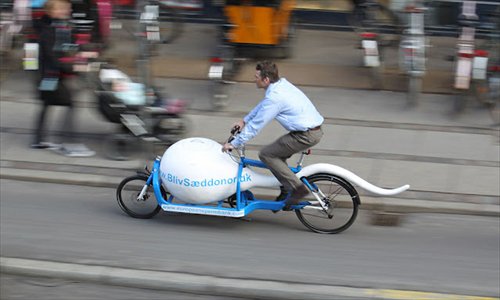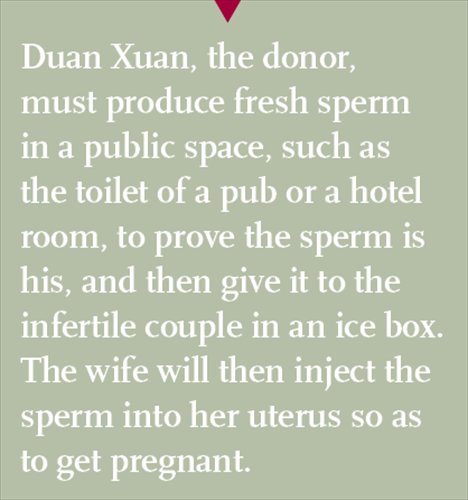Black market of sperm thrives in China as infertility rises
The declining quality of Chinese men's sperm has resulted in rising demand for sperm donation and a shortage of supply at sperm banks. This has spawned underground sperm trading, in which donors and wannabe mothers meet privately for sperm collection and injection and sometimes even sex. Experts warn these practices can be ethically and legally challenging.

A man rides the European Sperm Bank's "Sperm Bike" in Copenhagen. Photo: IC
It was 9pm in Yuexiu district, Guangzhou, and Duan Xuan (pseudonym), aged 31, was sitting in a pub when he received a phone call from his wife. He told her he'd be home late that night. Turning off the phone, he then said to the woman next to him: "If you choose me, I can promise you'll get pregnant with a boy."
This was not a tryst between adulterous lovers, but the scene of an underground sperm donation in China.
Duan, the donor, must produce fresh sperm in a public space, such as the toilet of a pub or a hotel room, to prove the sperm is his, and then present it to the infertile couple in an ice box. The wife will then inject the sperm into her uterus so as to get pregnant.
The rise of China's underground sperm market highlights how hard it is to get sperm legitimately, and infertile couples that are unable or unwilling to go through the laborious process of getting semen through sperm banks, are increasingly resorting to finding donors online to fulfill their dream of having children.
Sperm shortage
Research has shown that the quality of Chinese men's sperm is declining. The sperm bank at Shaanxi Province's Northwest Women and Children's Hospital has received over 10,000 sperm donation applications since it was established in 2011. But though the number of men applying to be donors has increased, the percentage of those that pass the bank's health tests has been dropping.
Although hospitals usually offer each donor 3,000 to 5,000 yuan ($455-750) in compensation, it's not easy money to earn. To ensure the quality of their sperm, donors usually need to donate at least 10 samples to finish the entire donation process. During the first few visits, they need to pass a series of all-round health checks and their sperm is sent for testing.
Zhang Zhou, vice director and doctor at the sperm bank, told China Business View that when the bank was first established, about 30 percent of donors passed the tests. By 2014, that percentage had dropped to 15 percent. In 2015, over 1,000 men applied, but only 100 were found to be qualified.
The low qualification rate has led to a shortage of sperm at most sperm banks. In the Northwest Women and Children's Hospital for example, over 1,400 couples applied for sperm donation but there were only 100 donors in 2015. The hospital relies heavily on their stored sperm to fulfill demand.
"Donate 40 milliliters of sperm, and you'll receive 5,000 yuan from the government," read an ad posted on the WeChat account of Hubei Province's sperm bank. The account also says that due to a severe sperm shortage, it is in urgent need of Wuhan-based donors aged between 22 and 45. To attract more donors, some sperm banks have even put up posters in residential neighborhoods.
The majority of sperm donors are college students. However, although the pay is attractive, the Changjiang Times found that most college students are unwilling to donate due to psychological and physical pressure and the negative image that's associated with sperm donation.
Ms. Ruan, aged 37, said she had decided to go through artificial insemination with donated sperm due to her husband's infertility. However, after visiting several sperm banks, most told her that she would have to wait at least one year due to a shortage of sperm. Even when her turn eventually came, the health checks, operations and possible failure might take another year. "The process is too long for us, we had to think of another way," Ruan told the Changjiang Times.

Going underground
As the legal supply of seed dwindles, infertility is becoming more and more common in China. Research conducted in 2012 shows that over 40 million people in China are infertile, accounting for 12.5 percent of the population at child-bearing age. This is over four times higher than in the 1980s, when the infertility rate was about 3 percent.
The increasing demand and shrinking supply at State-sanctioned sperm banks has spawned a murky underground sperm donation market, which has grown increasingly popular in recent years.
A website called China Sperm Donation has become the most popular forum for donors and sperm-seekers looking to meet each other. Many prospective donors post their information on the website to attract recipients. Some say they work as public servants or have studied overseas to prove their intellectual ability, and some make claims about the longevity of their grandparents and even great-grandparents to show they have good genes.
However, the number of prospective donors seem to far outnumber prospective recipients, as the forum on which donors post their information has over 130 pages, while the forum for sperm-seekers only has 8 pages.
A statement on the website says that due to the increasing number of fraudsters using the forum, it now offers an authorization service, and those who have proved their identities to the website will be marked as trustworthy users. But even this seems far from enough for a long and complicated process like sperm donation.
If one types "sperm donation QQ group" into a search engine, thousands of results will show up. Duan said he met the infertile couple on a QQ group called "self-service sperm donation," and he was promised several thousand yuan in return for his genetic material.
These practices are illegal in China. According to the regulation on sperm banks, issued in 2011, companies and individuals are not allowed to provide commercial services involving sperm collection and donation.
But since the donor and the recipient both do it voluntarily, these QQ groups and forums have existed for a long time with little interference.
Duan told New Express Daily that he is a manager at an advertising agency, and tried to prove it with a photo of his computer desktop, which was full of documents entitled "ad projects" and "ad materials." The background of the desktop is a smiling one-year-old, which Duan claims is his son. The photo has been used by Duan to prove his virility.
Like Duan, thousands of men post their information on sperm donation forums and QQ groups. While most of them claim they are healthy, good-looking, virile and are able to provide health check reports upon request, it's almost impossible to prove their real identity and the authenticity of their health reports. Most of the donors can get between 1,000 to 8,000 yuan for each donation, whether it is successful or not.
Seedy market
While many donors use Duan's method - called "indirect donation" - some offer the more controversial method - direct donation - which is a euphemistic term for having sex with the wannabe mother.
While many of these practices are seedy, as most men who offer direct donation are simply attracted by the free sex and money they can get from a deal, still some women are willing to take the risk.
Xiaohua (pseudonym), a villager who lives in Xi'an, Shaanxi, told China Business View she had to resort to having sex with a donor after years of suffering from the stigma of her husband's infertility. However, that didn't result in pregnancy and she eventually got pregnant through in vitro fertilization in a hospital.
Experts say both of these methods are highly risky, ethically, hygienically and legally. Sperm, for example, can be polluted by the container and injector used, and if the donor has HIV or venereal disease, the recipient may be infected. In the case of a direct donation, the fact that the donor has slept with the recipient is regarded by many as unethical even if the donation is successful.
And even though the donor and recipient can sign a contract stating that the recipient's husband is the only legal father, such a contract is not legally valid. This may result in legal problems for the child's mother and the donor, who's the biological father.
To help Chinese couples to make babies, many sperm banks are now allowing men who want to have a child later in life to store their sperm. In 2014, 286 men preserved their sperm at the Northwest Women and Children's hospital.
Doctor Zhang said most men who store their sperm are those who are suffering from serious diseases and are taking treatment such as radiation therapy. Saving their sperm will allow their partners to get pregnant even after they've been treated.
Newspaper headline: Donation through sex